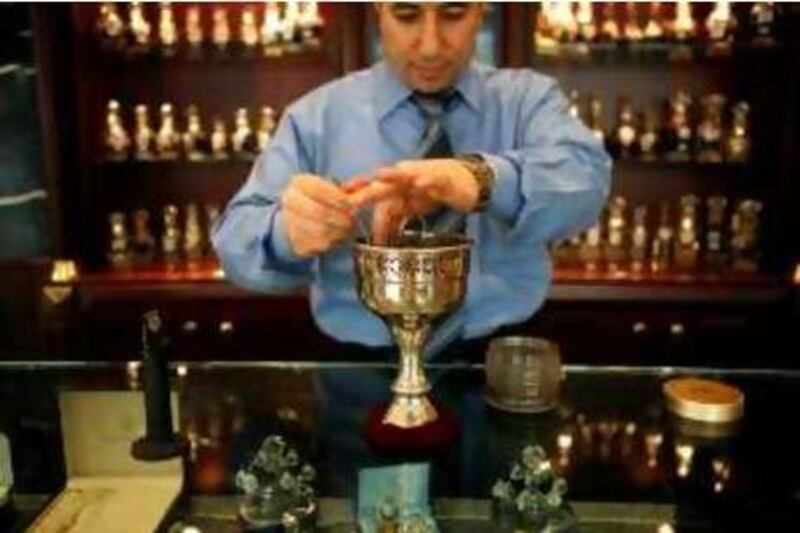The choice of a fragrance is one of the most personal decisions you can make. Spicy? Sweet? Musky? There are thousands of types of perfumes and colognes out there, made from hundreds of diverse ingredients, and finding the one that is a perfect complement to your lifestyle be a challenging - yet rewarding - task. If you are hunting for a new scent and find yourself on the usual French or Italian track, why not look closer to home? Something called oud might be the answer.
Oud is a natural perfume derived from the agarwood tree, and men and women all over the Middle East wear it daily. Indeed, if you are fairly new to the region and find yourself trying to place a distinctive yet mysterious odor while shopping in the mall, you are likely smelling oud. The first thing to know about oud is that it comes in hundreds of varieties, so finding yours might take some time. The origins of oud, and its introduction to the Middle East, can be traced back to the 3rd century AD, when it made its way to the region by se from India and Asia. The concept of a personal scent has remained an important part of society and this wonderful yet complex odour captures the imagination of many residents and visitors to the UAE.
Oud has a reputation of sophistication, and its fragrance is highly valued, which is why certain variations of the product can be sold for astonishingly high prices. The fragrance oil business is complex and multifaceted, involving many people in research and testing in order to produce the best possible merchandise. Since the agarwood tree grows very slowly over time, typically taking several hundred years or more to form, you can begin to understand why it is so rare and valued.
Oud may be burned as incense, and its oil is extracted to make perfume, explains Karim Shaikh, who works at Ajmal Perfumes store in Mall of the Emirates in Dubai. "Oud in fact is a fragrance category - not a type of ingredient that is extracted from a particular substance in a particular way," adds Mr Shaikh, a sales consultant at the perfumery, which began trading in India in 1951. "The fragrance is completely natural, as no chemicals are added during the extraction process."
The oil is worn on the skin and is mainly used by men during special occasions, such as Eid and Friday prayers, but it may also be given as part of a woman's marriage dowry. It is best applied on the body's pulse points, such as the inside of the wrist and behind the ears, so the body's heat can help the scent emanate. "The oldest and most expensive of our essential oils is Karim Karim, which retails at Dh2,600 a tola, 12ml," says Mr Shaikh. "One of our most popular products, Saif Al Hind costs Dh500 for a ruba tola, or 3ml, and is sold in a beautiful sword-shaped bottle, reflecting the true meaning of its name, Sword of India."
An wide selection of perfume bottles in which to store your oud are available at all perfume stores. The value of the solid form, which is burned in the same manner as incense, varies depending on the quality of the agarwood. The most common type, used in abundance in places such as mosques, will cost you Dh50 for a tola, while the more deep-pocketed may wish to indulge in a rare variety that costs Dh75,000 per kilogram.
"Variations in price occur due to the distinction in fragrance as well as the longevity of the scent itself," Mr Shaikh explains. An oud burner, known as an oudhan, is used to entice the fragrance from the wood and to generate incense that perfumes one's clothing and the surrounding area. At Ajmal Perfumes, an oudhan can cost anywhere from Dh50 to Dh100, but for those with more expensive tastes burners of gold and silver are also available.
To burn oud, you first heat charcoal on a stove and put it in the oudhan. You can expect to pay about Dh25 for a box of 80 charcoal briquets. "In order to release the aroma you don't actually need fire, only heat," Mr Shaikh said. "Break the wood into small pieces, and once the charcoal is glowing red place the wood chip directly on the charcoal for best effect." Stores that sell oud include Ajmal, Al Rassassi and Arabian Oud. These stores, usually found in malls, offer oud of consistent high quality, but souks are also great places to find a bargain if you enjoy haggling. Be sure to test a wide variety of scents before you settle on one. Oud makes a great gift and will certainly be well received when you mention that the resin is also used by Yves Saint Laurent and Amouage as a base in their top perfumes.






